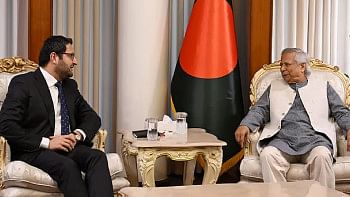Financing is the main challenge in achieving SDGs

Financing will be a major challenge for Bangladesh to attain the Sustainable Development Goals, the new development targets set by the United Nations, the Centre for Policy Dialogue said
yesterday.
To achieve the 17 SDGs by 2030, it is necessary to double domestic resources, as Bangladesh's tax-gross domestic product ratio is lower than Nepal's at present, said CPD Distinguished Fellow Debapriya Bhattacharya.
The tax-GDP ratio needs to be raised to 18 percent from the present 12.1 percent over the next five to 10 years, he said.
“Plugging in illicit financial flow will be a major challenge for us in that way,” he said, citing that the illegal outflow is 1.2 percent of the country's GDP.
Bhattacharya's comments came at a dialogue on the implementation challenges of the sustainable development agenda by 2030, organised by the CPD, Friedrich-Ebert-Stiftung and South Voice on post-MDG International Development Goals, at the Brac Centre Inn.
The 17 SDGs with 169 associated targets were adopted in September this year. The SDGs replaced the Millennium Development Goals that will expire at the end of the year.
The CPD identified five major challenges linked to the attainment of SDGs, including integrating SDGs into the national planning process, developing institutional mechanism and ensuring accountability.
Bangladesh also needs to increase its efficiency in utilising the concessional foreign funds, boost private and foreign investment as well as consolidate the present remittance inflows.
Bangladesh has to increase its utilisation of foreign aid from the present 1.6 percent to beyond 2 percent, Bhattacharya said.
The country is not spending enough on social security, he said, adding that it is lower than the target set under the sixth five-year plan.
The CPD said the average share of healthcare in total public expenditure stagnated at 0.7 percent of GDP during 2003-2014, which is much lower than the World Health Organisation's recommended 5 percent of GDP.
Similarly, budgetary allocation on education remains at 2 percent of GDP while Unesco recommended 6 percent. “So, we are much lower than the global standard in terms of health, education and social security.”
Of the 17 SDGs, eight are better integrated into the existing national prioritisation processes and the rest, which include health, inclusive growth, employment and governance, are weakly integrated.
The CPD also said it would form a Citizen's Platform involving similar organisations in order to ensure accountability and legitimacy for achieving the SDGs. Planning Minister AHM Mustafa Kamal said the country will be able to achieve SDGs. “We will make the country free from hunger by 2030.” He hopes that the revenue-GDP ratio will rise in line with the growth of tax collection.
For instance, the revenue receipts grew 21 percent on average in the last six years, Kamal added. Robert Watkins, UN resident coordinator in Bangladesh, said he sees big challenges with implementation at the local level.
Governance is also important to reduce inequality and ensure peace and justice, he said, while calling for coordination at the higher levels of the government.
Saber Hossain Chowdhury, a ruling party lawmaker, said the main challenge in achieving the SDGs would be making sure that the government, parliament and institutions are fit for the purpose. Water Aid Country Representative Md Khairul Islam suggested giving importance to water and sanitation.
“We should really think of developing institutions. We must set priority from our national context,” said AB Mirza Azizul Islam, former finance adviser to caretaker government.
Brac Founder and Chairperson Sir Fazle Hasan Abed, who chaired the event, said poverty eradication is not something that should be taken lightly.
He said the SDGs are not a government, civil society and private sector issue -- it is a citizen's agenda.
“If so, they need to know what to do,” he said, while suggesting inclusion of the SDGs and the targets in the school curriculum.

 For all latest news, follow The Daily Star's Google News channel.
For all latest news, follow The Daily Star's Google News channel. 



Comments